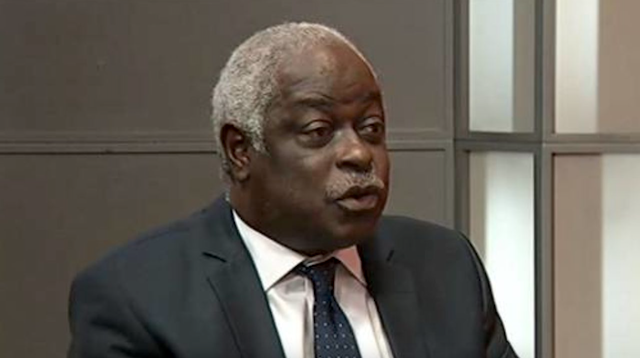Femi Aribisala
Pull Quote: I decided to confront the Director-General with the news that my God would remove him from office through a television announcement.
In 1986, I was appointed Special Adviser to Nigeria’s Minister of External Affairs, Professor Bolaji Akinyemi. When I was offered the job, my boss at the Nigerian Institute of International Affairs (NIIA), Professor Gabriel Olusanya, advised me to reject the offer. When I decided nevertheless to accept it, he gave me a bad security clearance. He said I was too close to my West Indian wife and would not be able to keep national secrets away from her. As a result, my appointment could not be confirmed.
Paradoxically, Professor Olusanya’s wife was also a West Indian. Moreover, the wife of Professor Akinyemi, the Foreign Minister I would be working with, was also not a Nigerian. She was British. It took the intervention of President Babangida to break the logjam. In his no-nonsense manner, the president gave the State Security Service an ultimatum to give me a security clearance within 48 hours.
Warfare
I was at the Ministry of External Affairs for a little less than two years. Then I took a decision that some insist was unwise: I decided to go back to the Institute. On return there, I faced a lot of petty persecutions from the Director-General, who now saw me as an adversary.
This was worsened by a curious development. Professor Bolaji Akinyemi invited Crispin Ogunseye and me to lunch. He then informed me that President Babangida had decided to make me the new Director-General of the Institute, as a replacement for Professor Olusanya. Even though I told no one at the Institute about this while still considering the offer, one of the staff, a gentleman called Saleh, somehow got wind of it and broadcast the matter to everyone.
After much rumination, I decided to decline the appointment. The crisis in my life at the time was not amenable to a highfalutin secular appointment. What I needed was Christ. When President Babangida “stepped aside” and Sani Abacha seized power as Head-of-State, the appointment of Director-General of the NIIA was then offered to a then junior colleague of mine at the Institute: Dr. George Obiozor.
I thought this would give me the respite I needed only to discover that George Obiozor too was not comfortable with me being in the Institute with him as Director-General. He made a foolish attempt to orchestrate my dismissal by accusing me of “gross incompetence” before the Appointments and Promotions Committee of the Institute. When that failed, he wrote me a letter stating that, as a result of some bogus reorganisation process, I had been prematurely retired at the tender age of forty-two.
Defended
I took the matter to God in prayer and presented the letter to him. I told him the Director-General could only have had the audacity to take such action out of confidence that, with President Babangida now out of power, I have no friends in the new Abacha administration. But I did not need to know any man. All I needed was to know God. Therefore, I asked God to answer the letter, so that my enemies in the Institute would know that I know God.
The Lord answered me with a scripture which I now regard as a covenant. Whenever you see it in the bible, don’t read it, because it now belongs exclusively to me. It says: “Fear not, for I am with you; be not dismayed, for I am your God. I will strengthen you, yes, I will help you, I will uphold you with my righteous right hand.” (Isaiah 41:10).
Guess what happened? The very next day Lateef Aminu, a colleague of mine, told me he had reported my case to someone in the presidency. He put me on the phone to an official in Aso Rock who asked me to come to Abuja the next day. Suddenly, I discovered that knowing God was enough to get me invited to the office of the Head of State. So, I bought a ticket and flew from Lagos to Abuja.
When I arrived there, I saw the aide-de-camp of one high-ranking naval officer who then took me to see his boss. After I gave him the details of my premature retirement, he said to me: “This is what we are going to do. By tomorrow, a circular will be sent from the Chief of General Staff to your Director-General, asking him to write you officially within twenty-four hours withdrawing your letter of retirement and reinstating you to your former position. Thereafter, we shall decide what to do with your boss.”
Let me make a confession here. I was not humble in victory. I went back to the Institute and reported the incident to everyone who would listen. “You people need to know you don’t mess around with a child of God,” I boasted foolishly.
The letter from the Presidency came as promised and the Director-General wrote me immediately reinstating me. But I was not satisfied. I reminded the Lord that the naval officer who spoke on his behalf said: “Thereafter, we shall decide what to do with your boss.” I wanted to know exactly what would happen to the Director-General. Then the Lord told me he would be unceremoniously dismissed from office on Tuesday through an announcement on the nine o’clock news of the Nigerian Television Authority.
Humbled
I became foolishly bullish again. I told everyone at work that the Director-General would be removed the next Tuesday. “This advance notice is not coming through Aso Rock (the Presidency),” I declared. “It is coming directly from the Lord God Almighty.” Then I decided to go a step further and confront the Director-General in person with the news that my God would remove him from office through a television announcement on Tuesday night.
My colleagues tried to dissuade me from doing this, but I refused to listen. Then some people I held in great respect came to see me. One of them was Yetunde Ogunseye, formerly Managing-Director, Associated Discount House, Lagos. She advised me that under no circumstances should I confront the Director-General with the prophecy since the Lord did not tell me to do so. Therefore, I decided to say nothing but to wait for the Tuesday night announcement.
That Tuesday night, I watched the news from beginning to end. There was no announcement whatsoever about the Director-General. The next morning, a colleague of mine, Margaret Vogt, came to see me at home before going to the office. She said: “I have just come to pray with you.” I understood her. Something had gone disastrously wrong. I had gone out on a limb with a prophecy and been put to shame. I swallowed my pride and spoke no more about it.
Vindicated
Some three years later, Yetunde Ogunseye came to see me. I was no longer working at the Institute but was now a full-time preacher of the gospel. “Did you watch the nine o’clock network news on Tuesday night?” she asked. I did not and wondered why she asked. Then she said: “George Obiozor, the Director-General of your former office, was dismissed through a television announcement.”
“Has (God) said, and shall he not do it? Or has he spoken, and shall he not make it good?” (Numbers 23:19).




